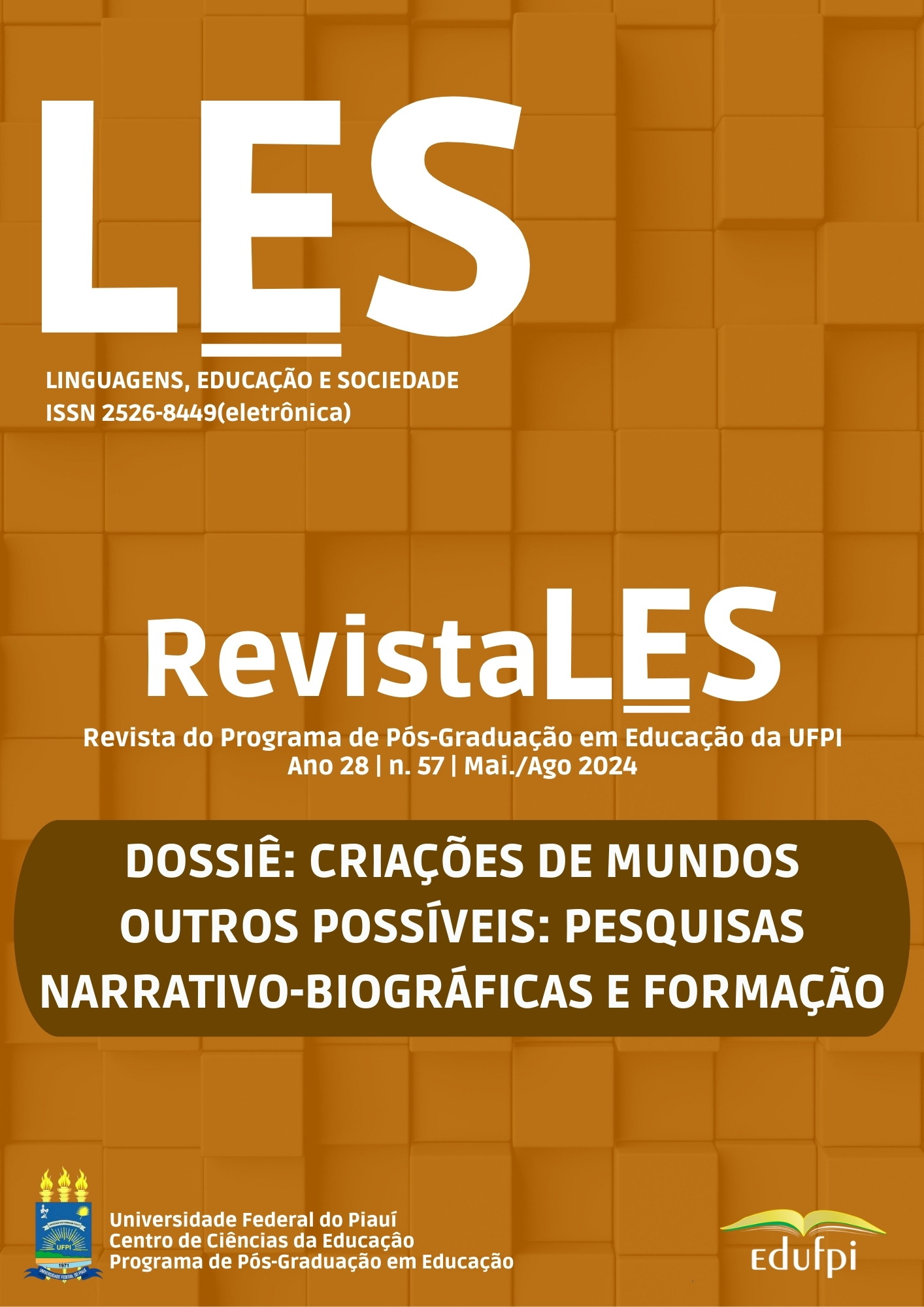O GRIÔ DENTRO E FORA DA ESCOLA: PARA UMA EDUCAÇÃO DECOLONIAL
DOI:
https://doi.org/10.26694/rles.v28i57.4669Palavras-chave:
Griôs, griot, educação decolonial, história africana e afro-brasileiraResumo
A inclusão da perspectiva afro-brasileira na educação formal teve importantes avanços nas últimas décadas, possibilitando inovações pedagógicas para a descolonização da educação. Dentre as mudanças, observamos a presença de mestres griôs nas escolas, introduzindo conhecimentos e procedimentos didáticos oriundos de espaços culturais extra-acadêmicos. O objetivo deste estudo é seguir os griôs dentro e fora da escola, para entender a conexão entre as práticas educativas no espaço formal e os saberes e fazeres ancestrais construídos em espaços tradicionais. Começamos com uma contextualização geral da figura dos griots em contexto africano e a sua crescente presença no Brasil atual, reconstruindo o processo da sua recente proliferação. Depois realizamos um acompanhamento etnográfico das atividades educativas de dois griôs na região metropolitana de Porto Alegre. Durante vários meses, observamos as atividades dos griôs na escola (rodas de conversa, palestras, apresentações teatrais) e fora da escola (encontro de capoeiristas, aulas de yorubá em terreiras de batuque). Os resultados mostram que a vivência extra-acadêmica dos griôs é fundamental na sua atuação escolar. Destaca o estudo das marcas linguísticas africanas no português falado no Brasil e do racismo colonial sem temporalidade linear. A história e cultura africana e afro-brasileira não são abordadas como um frio componente curricular, mas desde a sensibilidade afetiva e a firmeza antirracista, confrontando a inércia colonial de algumas práticas arraigadas no cotidiano escolar. Concluímos que a colaboração dos griôs no ensino formal tem enormes potenciais para descolonizar a educação, desde que articulada com a atuação dos docentes.
Downloads
Referências
ABREU, A. E. L.; FRANCISCHETT, G. P. P. Direito Fundamental à educação de qualidade: a pedagogia dos multiletramentos e o pensamento decolonial diante das diferenças. Revista Linguagem, Educação e Sociedade - LES, v. 24, n. 42, 2019. p. 232-253. https://doi.org/10.26694/les.v0i42.8842
ANJOS, José Carlos dos. (2019). Brasil: uma nação contra as suas minorias. Revista De Psicanálise Da SPPA, v. 26, n. 3, 2019. p. 507–522.
BARBOSA, Frederico e ARAÚJO, Herton Ellery (orgs.) Cultura Viva: avaliação do programa arte educação e cidadania. Brasília: Ipea, 2010.
COOK, William W. “The Afro-American Griot”. In: BROOKS, Charlotte K. (ed.) English and Language Arts for the Black Learner. Illinois: Black Caucus of the National Council of Teachers of English, 1985. pags. 260-272.
GOLDMAN, Márcio. 'Quinhentos anos de contato': por uma teoria etnográfica da (contra)mestiçagem. Maná, v. 21, p. 641-659, 2015. https://doi.org/10.1590/0104-93132015v21n3p641
GOMES, Nilma Lino. O Movimento Negro educador: saberes construídos nas lutas por emancipação. Petrópolis: Vozes, 2017.
GONZÁLEZ, Lélia. “Griot e Guerreiro”. In: Primavera para as Rosas Negras. São Paulo: Diáspora Africana Ed., 2018 [1984]. pp. 215-220.
HALE, T. A. From the griot of roots to the roots of griot: a new look at the origins of a controversial African term for bard. Oral Tradition, v. 12, n. 2, p. 249-278, 1997.
HALE, T. A. Griots and Griottes: Masters of Words and Music. Indiana: Indiana University Press, 2007.
HAMPATÉ BÂ, Amadou. “A Tradição Viva”. In: KI-ZERBO, J. (ed.) História Geral da África, I: Metodologia e pré-história da África – 2.ed. rev. – Brasília : UNESCO, 2010. pags. 167-213.
KI-ZERBO, Joseph. “Introdução Geral“. In: KI-ZERBO, J. (ed.) História Geral da África, I: Metodologia e pré-história da África – 2.ed. rev. – Brasília : UNESCO, 2010. pags. XXXI-LVII.
LOPES, Nei. Bantos, malês e identidade negra. Rio de Janeiro: Forense Universitária, 1988.
LOPES, Nei. Enciclopédia Brasileira da Diáspora Africana. São Paulo: Selo Negro Edições, 2014.
MARTINS, Bruno Rodolfo. Diversidade cultural nas aulas de Educação Física na Escola Pública: o embate com igrejas cristãs quando se trata de estudar culturas africanas e indígenas. Revista Interinstitucional Artes de Educar. Rio de Janeiro, V. 1, N. 2, jun - set 2015, pag 324 – 338.
NASCIMENTO, Abdias. O genocídio do negro brasileiro. Processo de um racismo mascarado. Rio de Janeiro: Paz e Terra, 1978.
NASCIMENTO, Abdias. O quilombismo. 2ª ed. Brasília: Fundação Cultural Palmares, 2002.
NIANE, D. T. Soundjata, ou l'épopée mandingue. Paris, Présence Africaine, 1960.
NIANE, D. T. “O Mali e a segunda expansão manden”. In: NIANE, D. T. (ed.) História Geral da África, IV: África do século XII ao XVI. – 2.ed. rev. – Brasília : UNESCO, 2010. pags. 133-193.
PACHECO, L. Pedagogia Griô. A reinvenção da Roda da Vida. Lençois (BA): Ministerio da Cultura - Brasil, 2006.
ROCHA, Luiz Carlos Paixão. Políticas Afirmativas e Educação: A Lei 10.639/03 no contexto das políticas educacionais no Brasil contemporâneo. Dissertação (Mestrado em Educação). Curitiba: UFPR, 2006.
ROSA, Allan da. Costas Lanhadas (Revides e Segredos antes do 13 de Maio). In: Reza de mãe e outros contos. São Paulo: Editora Nós, 2016. p. 31-33.
SALOM, Julio Souto. Quando chega o griô: conversas sobre a linguagem e o tempo com mestres afro-brasileiros. Tese (Doutorado em Sociologia). Porto Alegre: IFCH/PPGS/UFRGS, 2019. https://lume.ufrgs.br/handle/10183/200581
SANTOS, Carla Liane Nascimento dos; DANTAS, Tânia Regina. Processos de Afrobetização e Letramendo de (Re)Existências na Educação de Jovens e Adultos. Educação & Realidade. Porto Alegre, v. 45, n. 1., 2020.
SANTOS, Romilda Oliveira. A Literatura afro-brasileira e africana, caminho para implementação da Lei 10.639/03. Revista Interinstitucional Artes de Educar. Rio de Janeiro, V. 1, N. 2, jun - set 2015, pag 277-292.
SODRÉ, Muniz. Cultura Negra. In: A verdade Seduzida. Por um conceito de cultura no Brasil. 3ª ed. Rio de Janeiro: DPA, 2005. pp. 89-140.
TONET, J. J.; RODRIGUES, C. R., MENEGHEL, S. M. Educação intercultural como possibilidade de reconhecimento e valorização das diferenças. Revista Linguagem, Educação e Sociedade - LES, v.27, n.55, 2023. https://doi.org/10.26694/rles.v27i55.3993
TURINO, C. Pontos de cultura: o Brasil de baixo para cima. São Paulo: Anita Garibaldi, 2009.
VANSINA, J. “A tradição oral e sua metodologia”. In: KI-ZERBO, J. (ed.) História Geral da África, I: Metodologia e pré-história da África – 2.ed. rev. – Brasília : UNESCO, 2010. p. 139-166.













